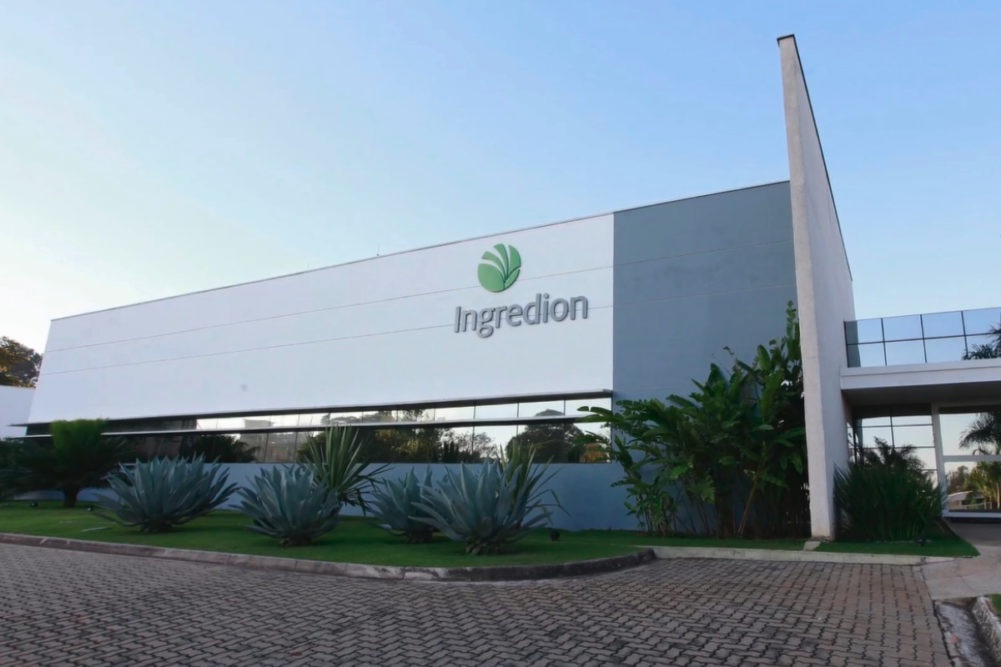WESTCHESTER, ILL. – Net income and sales both dipped for Ingredion, Inc. in the fiscal year Dec. 31, 2019, as foreign exchange rates and higher corn costs had a negative impact in several global regions. Positive news came in the forms of sales of specialty ingredients, including sweeteners and plant-based protein, and a Cost Smart savings program, both of which have the Westchester-based company projecting an increase in earnings per share in 2020.
Net income attributable to Ingredion of $413 million, or $6.17 per share on the common stock, was down 7% from $443 million, or $6.25 per share, in the previous fiscal year. Sales of $6,209 million were down 1% from $6,289 million in the previous fiscal year. Absent $292 million of negative foreign currency impacts, net sales were up 4%, James P. Zallie, president and chief executive officer, said in a Feb. 11 earnings call.
Ingredion’s stock price on the New York Stock Exchange closed at $98.51 per share on Feb. 11, which was up 7.5% from a close of $91.02 per share on Feb. 10.
“This year, we progressed our driving growth road map by advancing on-trend specialty growth platforms,” Mr. Zallie said. “Our specialties portfolio now represents 30% of our total net sales. Specialty growth was led primarily by starch-based texturizers as well as sugar reduction and specialty sweeteners. Starch-based texturizers delivered low single-digit net sales growth, driven by contributions from our tapioca and potato starch portfolios as well as the acquisition and integration of Western Polymer.”
Ingredion already has generated sales of Astraea allulose, a “rare” sugar that helps in sugar reduction, after opening an allulose production facility in Mexico in November, he said. Investments in plant-based proteins are allowing Ingredion to meet customer demand. A facility for plant protein in Nebraska should be operational in the second half of 2020.
“In North America, 2020 net sales and operating incomes are expected to be up, supported by specialty volume growth as sales momentum builds for plant-based proteins and allulose,” said James D. Gray, executive vice-president and chief financial officer.
A Cost Smart savings program was a plus for Ingredion results in 2019 and should continue to be in the years ahead.
“We achieved significant improvements in operational efficiencies and delivered nearly $75 million of run-rate savings, well in excess of our $30 million to $40 million Cost Smart savings target for 2019,” Mr. Zallie said. “We have broadened and accelerated our transformation efforts, and as a result, are increasing our three-year savings target to $150 million by 2021.”
In 2020, Ingredion expects e.p.s. in a range of $6.48 to $7.10 per share and adjusted e.p.s. in a range of $6.60 to $7.20, which would compare to adjusted e.p.s. of $6.65 in fiscal 2019. The outlook assumes an increase in operating income and mid- to high-single-digit net sales growth in specialty ingredients.
In North America in 2019, operating income of $522 million was down 4% from $545 million in the previous fiscal year. Higher corn costs offset improved price mix versus the prior year and Cost Smart savings benefits. Sales slipped 1% to $3,834 million from $3,857 million, primarily because of Ingredion transitioning a corn wet milling plant in Stockton, Calif., into a shipping distribution station in 2018.
In Asia-Pacific, operating income fell 16% to $87 million from $104 million, partially driven by increased corn costs in Australia. Sales decreased 2% to $823 million from $837 million due to an unfavorable currency impact.
Mr. Zallie said it would be premature to speculate on how a coronavirus that began in China might impact Ingredion’s 2020 results. China accounts for 2% to 2.5% of Ingredion’s global sales. Ingredion has two manufacturing facilities in China, he said, but both are more than 500 miles away from the city of Wuhan, which is where the virus originated.
The impact of the coronavirus thus far has involved a Chinese government-mandated delay for employees returning to work after the Chinese New Year and mixed signals on quarantine time periods, he said.
“That being said, one of our factories has been operating uninterrupted,” Mr. Zallie said. “The other factory has been operating one line only with an abbreviated staff, and it has been delayed in its production by approximately two weeks. All of our employees are safe. None of our employees, thus far, that we know of, have contracted coronavirus, and the office has a protocol in place in regards to how to operate the sales office, which has been operating each and every day with reduced staff.”
In South America, operating income dropped 3% to $96 million from $99 million in the previous fiscal year. A negative foreign exchange impact and higher corn costs were offset partially by pricing, specialties volume growth and Cost Smart savings. Sales decreased 3% to $960 million from $988 million.
In Europe, Middle East and Africa (EMEA), operating income fell 15% to $99 million from $116 million. Higher corn costs and foreign exchange impacts in both Pakistan and Europe drove the decrease. Sales dropped 2% to $592 million from $607 million, primarily driven by foreign currency weakness in Pakistan.
In the fourth quarter, net income attributable to Ingredion of $109 million, or $1.63 per share on the common stock, was up 16% from $94 million, or $1.38 per share, in the previous year’s fourth quarter. Sales in the fourth quarter increased 1% to $1,549 million from $1,537 million as pricing actions more than offset a negative foreign currency impact.

